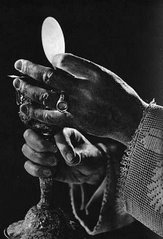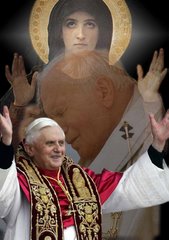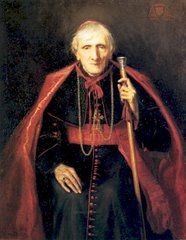Young Republicans: meet the new boss, same as the old boss...
This interesting piece on contemporary conservatism as closeted liberalism and Catholicism as true liberation comes from Matthew Fish, whose blog "Nel mezzo del cammin di nostra vita" will now have a link at the Parousian Post. He is an English teacher at Jesuit High School in Dallas who has completed graduate studies in theology. Be sure to check out his defense of the Society of Jesus as well.
From Fish's post:
"In other words, there is no liberation, political or any other kind, none at all, than the liberation brought by the grace of Christ in the Church his Body. Liberalism in a nutshell consists in replacing this unequivocal Gospel vision of liberation with secular varities (and imitations), and consequently vanquishing the theological (that is, the explicit Gospel) to a "private sphere" where it eventually dies, having become entirely subordinate to the secular political order. And what I thought would escape this, American conservatism, I found was in fact just another version of this liberalism, particularly in its enthusiastic embrace of the free market and the separation of Church and state.
In no time I began to hear typical conservative rhetoric differently. Reading magazines like National Review took on a whole new character. The more I studied the culture-changing imperative of the Magisterium in the last fifty years, the more I undestood how inimical the two approaches are. And in reading the work at the root of modernity--Machiavelli, Hobbes, Bacon, Descartes, Locke, Kant, and even Whigs like Burke--I saw how neatly they all fit together, moving from a common lot of shared principles, wholly different and antagonistic to the ones that inspired the Medieval order which they sought to replace. And in reading authors like Peter Maurin, Dorothy Day, Alexander Solzhenitsyn, G.K. Chesteron, Hilaire Belloc, and Alasdair MacIntyre, I saw for the first time a different approach, an approach beyond the categories of liberal-conservative, and in studying Aristotle, Augustine, St. Thomas, and the modern Popes in their social teaching, I grasped the principles of such an approach, principles that indeed make a quasi-comfortable alliance with modern liberals and conservatives (i.e. both liberals at root) difficult if not impossible. For in the end, we are working and fighting for different things."
Wednesday, November 08, 2006
Subscribe to:
Post Comments (Atom)






No comments:
Post a Comment